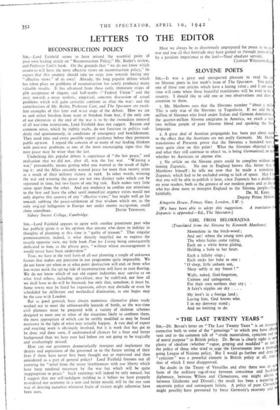LETTERS TO THE EDITOR
RECONSTRUCTION POLICY
SIR,—Lord Fairfield seems to have missed the essential point of your own leading article on "Reconstruction Policy," Mr. Butler's review, and Professor Carr's book. On the grounds that "we do not know which countries w:11 have the most effective views on reconstruction policy," he argues that this country should take no steps now towards having any "effective views" of its own! Already, the long popular debate which has taken place on problems of reconstruction has surely produced many valuable results. It has advanced from those early, immature stages of glib acceptance of slogans and half-truths (" Federal Union" and the rest) towards a more realistic, empirical, concrete discussion of actual problems which will quite certainly confront us after the war: and the contributions of Mr. Butler, Professor Carr, and The Spectator are excel- lent examples of this later and wiser stage of the debate. How we are to seek either freedom from want or freedom from fear, if the only aim of our electorate at the end of the war is to be the immediate removal of all war-time restrictions, Lord Fairfield does not suggest. Reason and common sense, which he rightly exalts, do not function in politics sud- denly and spontaneously, in conditions of emergency and bewilderment. They need time and every possible expert guidance before they permeate public opinion. I regard the concern of so many of our leading thinkers with post-war problems as one of the most encouraging signs that the next peace may be wiser than the last.
Underlying this popular debate is experience of "the lost peace," and realisation that we did not, after all, win the last war. "Winning a war," presumably, means getting what you wanted as the result of fight- ing it: and the Allies certainly wanted peace for more than twenty years as a result of their military victory in 1918. In other words, winning the war and winning the .peace are not two distinct tasks which can be separated in time, but two facets of one big task. Each makes very little sense apart from the other. And any tendency to confine our attentions to the first and leave the other until immediate urgency exists would not only deprive this country of any "effective v:ews," but might well go far towards robbing the peace-settlement of that wisdom which we, as the only orig:nal belligerent in Europe not under enemy occupation, could
alone contribute. DAVID THOMSON. Sidney Sussex College, Cambridge.


























 Previous page
Previous page